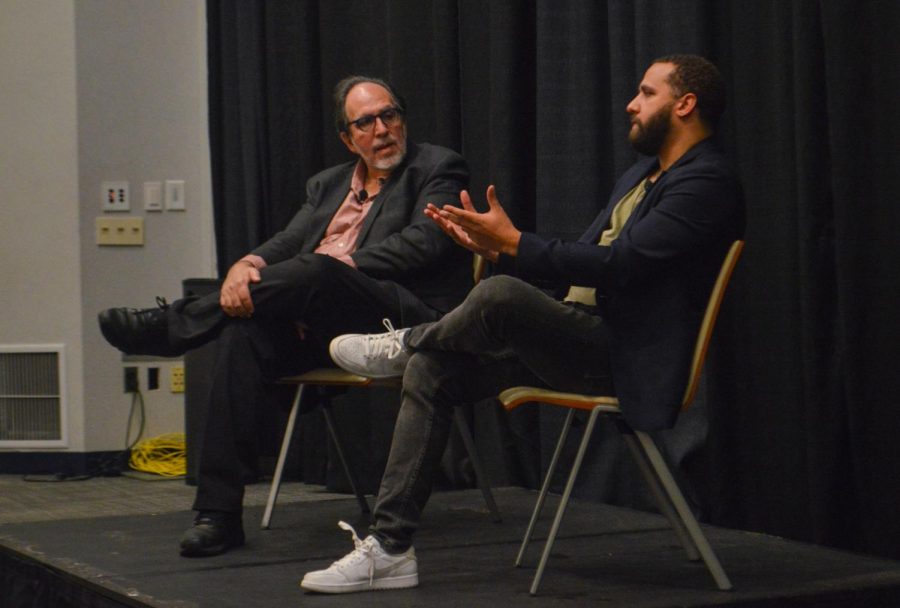Wesley Lowery visits Northeastern, discusses journalists’ role in racial justice movements
Wesley Lowery spoke to Northeastern community members Oct. 18.
October 22, 2021
Wesley Lowery, a Pulitzer Prize–winning journalist, spoke to students and faculty in Northeastern’s Raytheon Amphitheater Monday, Oct. 18 about his career and experiences covering police shootings and racial justice protests around the nation.
Attendees filled the event space at 5 p.m., leaving some students standing in the back or sitting on the floor.
“The fact that so many people are here when it wasn’t one of the university’s most widely publicized events is really impressive,” said second-year environmental and sustainability sciences major Alegra Germain. “I think it’s a testament to Northeastern students because we’re always very driven to learn and always want to hear multiple perspectives.”
Recalling his coverage for the Washington Post of the 2014 protests that followed the murder of Michael Brown in Ferguson, Missouri, Lowery shared some of the lessons he learned from reporting on the ground.
“I used to think about our job as journalists as giving voice to the voiceless,” Lowery said. “I remember one of the activists that I talked to correcting me one day and noting that there are no voiceless people, but there are people who are unheard.”
Lowery also explained to students his belief that it is okay to be passionate about issues and still remain an objective journalist.
“The best journalists are passionate about things,” Lowery said. “Too often, especially on issues of race, we are governed by the appearance of objectivity. Factual objectivity is not about person, it’s about process. No journalist is objective because no person is objective. We all have biases; we all have life experiences that color how we see the world we live in. We all bring who we are to everything we do.”
Lowery spoke for about 40 minutes before taking several questions from students and professors. The event was followed by a reception, where students had the opportunity to interact with Lowery in smaller groups.
“After the talk, he came up to me and my friends, and he offered some advice on how to succeed as a journalist, how to get out there and get experience,” said first-year journalism and political science combined major Julia Yohe. “It was really cool that he was so willing to engage with us after he had given this speech. He was so open and ready to talk. He genuinely wanted to communicate with us.”
At 31 years old, Lowery is considered young in the field of journalism.
“In his decade as a journalist, [Lowery] has really blazed a trail across newsrooms,” said Jonathan Kaufman, director of the School of Journalism, while introducing Lowery. Lowery’s age allowed some students to better relate to his perspectives.
“Part of the reason why I came is because so rarely do we hear from our peers. It’s really interesting to take a more modern approach on ‘here’s what he’s doing. Here’s how he’s doing it, and here’s kind of what the industry looks like right here, right now.,’” Germain said. “He’s a millennial, and he has the same social media platforms that we do and he has similar experiences and he was in college not that long ago. [It’s] very humanizing, very refreshing. I think it was a very realistic perspective.”
The event was publicized to students through emails sent by the College of Arts, Media and Design, or CAMD, but students whose home college is not CAMD had to use other means to learn more about Lowery’s visit.
“Even though I have a registered minor in CAMD, I didn’t get any emails [about the event],” Germain said. “The only way I knew about this is because [my professor] told us in class. I know friends who are not journalism majors who would have loved this kind of event, who would have been the first people standing at the door waiting to hear what he has to say.”
Several journalism majors attended after reading Lowery’s book “They Can’t Kill Us All” in class. First-year journalism and political science combined major Dakota Castro-Jarett said Lowery’s speech and book reinforced the idea that journalism is needed now, in such unprecedented times.
“We’re entering a new period of American history and there’s always something that needs to be covered [and] needs to be talked about more in depth, which I’m excited about,” Castro-Jarett said.
Lowery told students that going forward, he hopes to see more diversity in newsrooms and less of a willingness to use objectivity in media to appease the biases of white readers.
“I think it’s important for us to be self-critical, to be introspective,” Lowery said. “I think it’s important for us to be willing and able to critique our journalism so that we can do better journalism the next day.”







